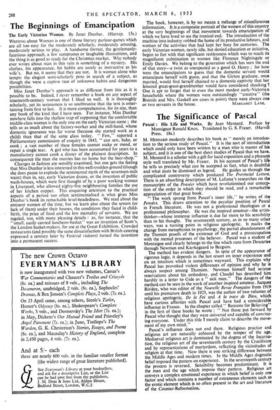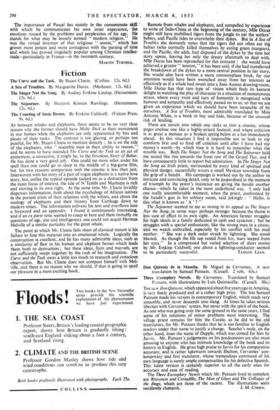The Significance of Pascal
M. MESNARD modestly describes his book as " merely an introduc- tion to the serious study of Pascal." It is the sort of introduction which could only have been written by a man who is master of his subject, and it is one of the best short studies of Pascal that we have. M. Mesnard is a scholar with a gift for lucid exposition and a pleasant style well translated by Mr. Fraser. In his account of Pascal's life he tells us precisely what can be accepted as fact, what is doubtful and what must be dismissed as legend. He guides us through the complicated controversy which produced The Provincial Letters. There is an absorbing description of M. Lafuma's researches on the manuscripts of the Pensies which have revolutionised our concep- tion of the order in which they should be read, and a remarkable appreciation of that great book. " The work sprang from Pascal's inner life," he writes of the Pensies. This draws attention to the peculiar position of Pascal in French literature. He was not a professional theologian at a professional philosopher. He was the inspired amateur—the artist- thinker—whose immense influence is due far more to his sensibility than to his thought. The seventeenth century, as in so many other ways, was a turning point in religious apologetic. It marks the change from metaphysics to psychology, the partial abandonment of the Thomist proofs of the existence of God and a preoccupation with the mental processes of the believer. Pascal was a student of Montaigne and clearly belongs to the line which runs from Descartes through Newman and Kierkegaard to Bergson. The method has evident dangers. In spite of the appearance of rigorous logic, it depends in the last resort on inner experience and on an intuition which is- sometimes wayward. This explains why Pascal has provoked violent differences of opinion and why he is always suspect among Thomists. Newman himself had setious reservations about his orthodoxy, and Claudel has described him harshly in a letter to Gide as a " sick man." The dangers of the method can be seen in the wor k of another inspired amateur. Jacques Riviere, who was editor of the Nouvelle Revue Francaise from 1919 until his premature death in 1925, was the author of two volumes of religious apologetic, De la Foi and A la trace de Dieu, which have curious affinities with Pascal and have had a considerable influence in France. In the chapter called." Reasons for Believing" in the first of these books he wrote : " Not those put forward by Pascal who thought that they were universal and capable of convinc- ing everyone. Under this title i merely claim to describe the move- ment of my own mind." Pascal's influence does not end there. Religious practice and religious art are naturally coloured- by the temper of the age. Mediaeval religious art is dominated by the dogma of the Incarna- tion, the religious art of the seventeenth century by the Crucifixion and by representations of martyrdom, reflecting the vicissitudes of religion at that time. Now there is one striking difference between the Middle Ages and modern times. In the Middle Ages dogmatic belief imposed the pattern on experience. In the seventeenth century the process is reversed. Sensibility becomes predominant. It is the man and the age which impose their pattern. Religious art conveys a complex emotional experience in which belief is only one factor and which contains a number of extraneous elements such as the erotic element which. is so often present in the art and literature of the Counter-Reformation. The importance of Pascal lies mainly in the consummate skill with which he communicates his own inner experience, the emotions roused by the problems and perplexities of his age. He stands for what may be loosely termed " modern religion." He was the virtual inventor of that religious " unrest," which has giown more potent and more contagious with the passing of time and which has proved singularly popular among Christian intellec- tuals—particularly in France—in the twentieth century.
MARTIN TURNELL.
. _



































 Previous page
Previous page